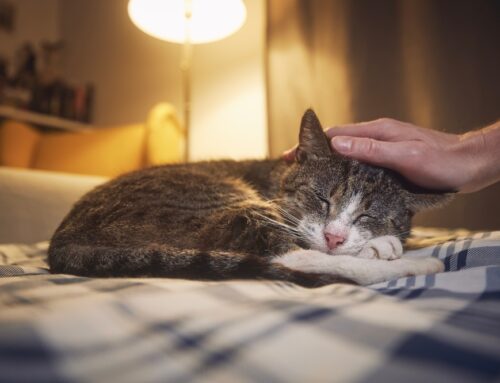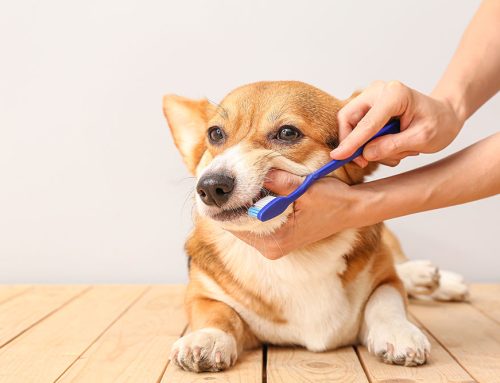Allergic to Ohio: Management of Seasonal Allergies in Dogs and Cats
North Royalton’s trees, grasses, and flowers make Northeast Ohio a green paradise until pollen counts surge. A peaceful evening walk can quickly turn into paw chewing and restless nights filled with head shaking. Seasonal allergies are among the most common reasons pets visit North Royalton Animal Hospital. With the right diagnostics and treatment plan, we can move pets from misery to comfort.
Why Pets Develop Seasonal Allergies
Allergies occur when a pet’s immune system mistakes harmless particles such as pollen, mold, or dust for threats and responds with inflammation. The more a pet is exposed, the more the immune system reacts, meaning each season often gets worse without intervention. This isn’t just a dog problem- cats have allergies, too!
| Contributing Factor | How It Affects Pets |
| Genetics | Bulldogs, Retrievers, and Terriers are predisposed to atopic dermatitis. |
| Climate | Ohio’s humid springs trap pollen, while damp autumn leaves foster mold spores. |
| Indoor allergen load | Carpets and HVAC systems recirculate pollen and dust long after outdoor exposure. |
| Immune misfire | Overactive immune systems release histamine, producing redness, itching, and swelling. |
Planning Ahead With Pet Insurance
If you know that you have a breed of dog more likely to develop atopic dermatitis or food sensitivities, or are planning to adopt a pet- do yourself a favor and get pet insurance. Pet insurance can save you many thousands of dollars over the course of your pet’s life by covering diagnostics, medications, and long-term therapies before costs become overwhelming. Enrolling early, before symptoms appear, ensures coverage is in place when allergies start to develop.
Recognizing When Allergies Become Serious
Not all itching is a minor nuisance. In allergic pets, the urge to scratch or chew can become overwhelming, keeping them (and you) awake at night and leaving skin raw, bleeding, and infected within hours. Many pets will lick or chew until the hair is gone and sores have formed, sometimes to the point where they cannot settle or rest. Seasonal allergies can spiral into painful and sometimes emergency situations.
Skin and Coat Complications
Allergic skin disease is one of the most common and most uncomfortable outcomes of seasonal allergies. Problems may include:
- Hot spots (pyotraumatic dermatitis): Raw, oozing wounds that appear within hours from chewing or licking.
- Thickened skin and hair loss: Long-term inflammation can cause darkened, leathery patches called “lichenification”. Common along the belly, elbows, tail base, or flanks.
- Secondary infections: Allergies often pave the way for bacterial and yeast overgrowth that worsen itching and odor.
- Paw problems: Constant paw licking and chewing can lead to pododermatitis, swollen interdigital spaces, and sometimes interdigital furunculosis.
Ear and Eye Problems
Ears and eyes are frequent targets for allergic inflammation:
- Ear infections: Painful, smelly, with discharge and head shaking.
- Ear hematomas: Caused by ruptured blood vessels after vigorous scratching or shaking, often requiring surgery.
- Conjunctivitis: Red, watery eyes with squinting or pawing at the face.
- Corneal ulcers: Painful scratches to the eye surface that can threaten vision if untreated.
Respiratory and Systemic Signs
Allergies do not stop at the skin. In some pets, inhaled allergens affect the respiratory system or trigger systemic reactions. Sneezing or reverse sneezing episodes after outdoor exposure and clear nasal discharge are expected in pets with environmental allergies; the occasional wheeze or increased snoring is also not uncommon.
More serious signs include:
- Facial swelling
- Widespread hives
- Vomiting or diarrhea after exposure
- Collapse, seizures, or labored breathing consistent with anaphylaxis
These systemic reactions are emergencies and require immediate veterinary care.
Emergency Treatment for Anaphylaxis
The most dangerous allergic reaction we see is anaphylaxis. These cases are true emergencies and require immediate, aggressive treatment. Our emergency protocol may include:
- Epinephrine injections, antihistamines, steroids, and other medications to rapidly reverse airway swelling and shock
- Intravenous fluids and oxygen therapy to stabilize blood pressure, breathing, and circulation
- Continuous monitoring and hospitalization to watch for relapse, since symptoms can return within hours
Anaphylaxis can progress in minutes. If you ever see sudden swelling, hives, or collapse, contact us immediately, come directly to our emergency service, or go to the nearest veterinary ER.
Diagnostic Approach at North Royalton Animal Hospital
Every pet presents differently, which is why an accurate diagnosis is critical. During the exam, our veterinarians:
- Collect a full history of seasonal timing, diet, grooming habits, and prior reactions
- Perform a full physical exam, plus dermatologic exam focused on paws, ears, and skin folds
- Use ear and skin swabs to run cytology, identifying parasites and bacterial or yeast overgrowth. Veterinary ear cytology is especially important for pets with recurring otitis. Difficult infections may also require culture and sensitivity testing.
- Recommend allergy testing, either intradermal or serum, to pinpoint triggers
- Rule out parasites or food sensitivities with targeted protocols
This thorough approach ensures your pet receives a tailored treatment plan, supported by our comprehensive medical services.
Treatment Options for Allergic Pets
Allergies often require both immediate relief and long-term management. At North Royalton Animal Hospital, treatment plans are customized to each pet’s needs.
Fast-Acting Medications
Antihistamines can help mild hives and itching, while targeted itch blockers like Apoquel® and Cytopoint® disrupt the itch-scratch cycle more effectively. Short courses of corticosteroids may be used for sudden, severe flare-ups. If infections are present, we prescribe cytology or culture-directed antibiotics or antifungals to resolve them fully.
Topical Therapy
Topicals are one of the most effective ways to control allergies at the source. Medicated shampoos wash allergens off the coat and soothe inflamed skin, especially when left on for 10 minutes before rinsing. Wipes and mousses are useful between baths for paws, hot spots, and skin folds, while leave-on sprays and rinses calm irritation and help prevent infection. Regular topical care not only reduces redness and itching but also lowers the need for systemic drugs over time. The role of topical therapy is well documented in preventing flare-ups from escalating.
Need help with bathing? Paws at Play Resort and Daycare offers grooming services, customizing shampoo and conditioning treatments just for pets with allergies.
Nutritional Support
Therapeutic diets enriched with omega-3 fatty acids strengthen the skin barrier and reduce inflammation. Some pets benefit from hydrolyzed or limited-ingredient diets to rule out food-related allergies.
Parasite Prevention
A single flea bite can cause much more severe symptoms in pets that are already having an allergic flare up, compared to a pet with a healthy skin barrier. Year-round parasite prevention for all pets in the home is critical.
Immunotherapy
For pets with chronic or severe allergies, custom immunotherapy drops or injections retrain the immune system to tolerate allergens. Most pets show improvement within months, with maximum results in about a year.
Our in-house and online pharmacy makes it easy to start your pet’s personalized treatment without delay.

Emergency and Urgent Care Availability
At North Royalton Animal Hospital, we know that allergy flares do not follow business hours. If your pet develops sudden facial swelling, severe breathing difficulty, or collapse, immediate care is required.
We Accept Emergencies When Open: Our on-premise veterinarians and technical staff respond to emergency calls and critical care situations during our open hours. After-hours, we refer to trusted partners including MedVet Cleveland West, Metropolitan Veterinary Hospital, MedVet Akron, and VCA Great Lakes Veterinary Specialists.
We do our best to accept or guide both current and new patients for urgent and emergency appointments. Help is only a phone call away.
Relief Starts Here
Seasonal allergies are more than an inconvenience. They can lead to painful infections, systemic reactions, and repeated emergency visits if not managed properly. At North Royalton Animal Hospital, we focus not only on treating the crisis but also on preventing the next one. Our Cat-Friendly practice with Fear Free Certified Professionals works hard to make sure we’re providing the best care possible for both dogs and cats in a gentle, compassionate manner. Our fabulous grooming team at Paws at Play offers bathing services just for allergic pets.
If your pet is showing signs of severe allergies, request an appointment online or call 440-237-7691 today. Together, we can build a personalized plan that restores comfort and prevents future emergencies.








Leave A Comment